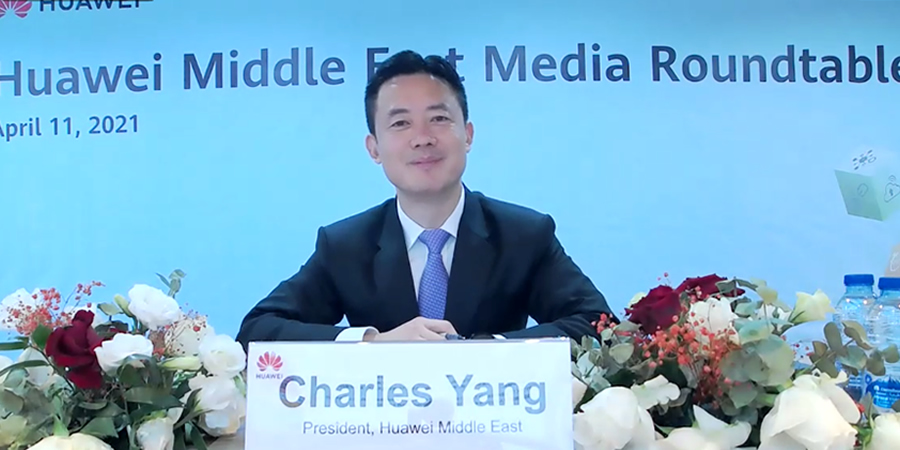Telecom Review has been invited to join the recently conducted exclusive online media roundtable hosted by Mr. Charles Yang, president of Huawei Middle East.
In the two-hour session, Mr. Yang shared his insights particularly in the information and communication technology (ICT) sector’s role as an engine in the digital economy and how Huawei innovates in its services for enterprises within the Middle East and globally.
When asked by Telecom Review about the next steps the tech giant is planning to do to innovate its services for enterprises, Mr. Yang emphasized first that the ICT industry is crucial — fundamental — to the digital economy.
According to the President, taking into consideration the enterprise market, Huawei worked with 30,000 partners globally while in terms of the cloud business, they delivered around 220 services alongside more than 19,000 partners and 1.6 million developers. Moreover, the company also received 80 industry certifications, proving its leadership within the industry.
He specifically cited examples among thousands of enterprise applications that Huawei has been involved in. The first one mentioned is Huawei’s collaboration with Saudi Aramco. The companies, together with stc, will launch a joint innovation program for 5G technology and applications focused on technological advancement in the oil and gas sector. As per Mr. Yang, within the Middle East, this sector can be the key to economic revival.
Mr. Yang also highlighted the City Intelligent Twins architecture that focuses on upgrading governments and enterprises for smart city innovation. This will leverage the cloud as the foundation and AI as the core. Aiming to make Qatar the regional data hub, Huawei brings the City Intelligent Twins solution for the first time in the Middle East region during the Milipol Qatar 2021 event.
In detail, Huawei and partners have put Intelligent Twins into practice in more than 600 projects covering a wide range of industries such as government and public utilities, transportation, industry, energy, finance, healthcare, and research and development (R&D).
In line with the belief that the ICT industry is fundamental for the digital economy, Mr. Yang proudly affirmed that the 5G development in the GCC region is leading in the world. In terms of ICT growth this 2021, the executive gains confidence in the business performance within the region after having a solid presence in the past two decades. The carrier business is expected to be stable as enterprise and cloud business is anticipated to grow further.
‘Huawei will develop 100,000 ICT talents in next 3 years in Middle East’
“Our commitment to the region is that we will develop 100,000 ICT talents in the Middle East over the next three years,” said Mr. Yang in response to the Telecom Review question regarding the role of Huawei in enhancing the digital skills for employees in the public and private sector organizations.
He said, “Digital skills training for enterprises and government sector is happening actively with many countries. We have ICT certifications scheme offering online courses. Participants can take the courses online and get certified by Huawei in specific ICT skills. We have just delivered ICT training in Kuwait in collaboration with CIAT and in Qatar in collaboration with MoTC.”
Also responding to similar questions related to the kingdom of Bahrain, he said, “We have signed MoU with 5 universities in Bahrain to support them in developing Huawei ICT academies. Based on Huawei’s global industry experience, we can collaborate to provide ICT-related training to both the faculty and students. The MoUs are only the beginnings of our overall efforts. In the future, we will enhance cooperation with our partners in knowledge and technology transfer, talent training and ICT laboratories to speed up and enhance the ICT talent developments in the region.”
Responding to another question for Huawei’s 2021 plan in talent development, Mr. Yang said, “In regards to talent developments, we have several programs such as Seize the Future ICT competition, ICT academy, and ICT labs. In the past 2 years, we have made significant contributions in these programs. For example, Seize the Future programme in 2020, 281 students participated in the Middle East. The target this year is going to be 400 students. We started hosting this programme in the Middle East in 2017 and now it has become one of the most influential events. Last year, we cooperated with more than 20 ministries, 400-plus universities in organizing the ICT competition attended by 15000 students. These efforts will be continued and we will leverage this platform to inspire more students to learn ICT knowledge. Huawei has more than 103 ICT academies in the region.
“In 2021, we will include other operations with universities. In March, I visited the Ministry of Education in Qatar and we talked about this topic. The ministry showed great interest and said that it will encourage universities to establish ICT academies to train more talents. As for laboratories, we now fund 53 universities and this effort will be continued. Apart from that, we are discussing with many government partners to provide training courses. These trainings will be important for future economic growth in the Middle East.”
Mr. Yang tackled various topics related to digital-led economic growth post-COVID-19, the collaboration of public and private sectors, new technologies driving the digital economy in the region, business and social value, and 5G adoption across industries including healthcare, transportation, energy.











